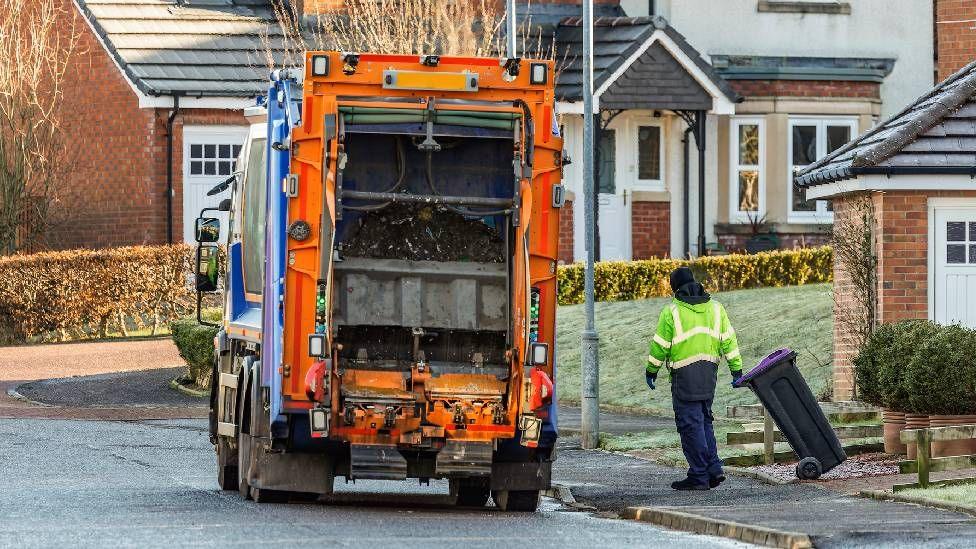Funding plans 'not close to what councils need'

Councils say their finances are under pressure due to increasing demand for things such as social care
- Published
Plans to give schools, social care and other council run services an extra £169m in Wales next year do not come close to what councils need, local governments have said.
Labour ministers have published how it plans to fund local government next year, should their budget proposals pass the Welsh Parliament in January.
The projected increase is less than a third of the shortfall of £560m councils expect to face in 2026 - Plaid Cymru said it could lead to double-digit tax hikes and job losses.
The Welsh government said it was the start of the process and it would work closely with councils "to see where we can provide additional flexibility".
Drakeford hopes budget talks help NHS and councils
- Published4 November
NHS, housing and councils winners in budget plans
- Published4 November
Councils say they are under pressure because of increasing demand for social care and temporary accommodation for homelessness, as well as increases in staff pay.
The plans for 2026/27 may change, with Labour ministers in the midst of talks with opposition politicians to agree a deal for that year's budget - its spending plans for health, councils and other services.
Finance Secretary Mark Drakeford has said he hopes he can provide extra money for councils - which fund schools, social care and waste collection.
Conservatives said the plans showed the need for "fundamental change".
The Welsh government has promised all local authorities at least 2.3% extra to the money they receive for day to day spending on things like education and waste services.
Figures from the Welsh Local Government Association (WLGA) estimate that even a 3% increase would leave councils short of £373m - equivalent to a 19% council tax rise or losing 12,000 employees.
An increase of 2% was estimated to leave authorities short of £436m, or 22%.
Andrew Morgan, leader of both Rhondda Cynon Taf council and the WLGA, said the settlement "offers a degree of stability".
He added: "But stability doesn't remove the pressures themselves. Social care, homelessness, education and workforce costs continue to rise faster than resources can keep up. Councils will still need to make tough choices, and that remains a concern."
Grants from the Welsh government form the largest chunk of funding for councils - substantially more than what residents pay in council tax.
Draft figures from the Welsh government show council funding increasing by £169m to £6.4bn in 2026/27 - a 2.7% increase.
But what each council gets varies.
How much each authority receives is determined by a formula, based on things like an area's economic situation, its population and demographics.
Next year ministers want to apply a funding "floor" to ensure no council gets less than 2.3%.
This applies to half of Wales' 22 councils, including the capital, Cardiff, and most of Wales' rural counties such as Monmouthshire, Gwynedd and Powys.
Newport will receive the best settlement of the 22 with 4.3% extra - £14m - because of a rise in the number of school age children in the city.
'To the brink'
Plaid Cymru's Heledd Fychan said: "The provisional local government settlement for 2026-27 announced today will be hugely concerning for all local authorities in Wales, especially our rural communities in Carmarthenshire, Ceredigion, Gwynedd and Ynys Môn who will receive the lowest level of funding.
She said the settlement would "push local authorities to the brink, with the potential of council tax hikes of over 20% and thousands of job losses now a very real prospect".
Welsh Conservative shadow cabinet secretary for local government, Joel James, said the settlement was "proof of the need for fundamental change".
He said the Conservatives would "cut the waste, review and replace the woefully out-of-date funding formula to address the fact that some councils are sitting on hundreds of millions in reserves, and introduce local referendums to protect the public against inflation-busting council tax rises".
A Welsh government spokesperson said: "The draft budget and this provisional Local Government Settlement allows local authorities to plan with some certainty but it is important to remember this is just the beginning of the budget process.
"It is our firm ambition to secure a Final Budget which uses all the resources available for 2026-27, safeguards jobs and protects frontline public services."